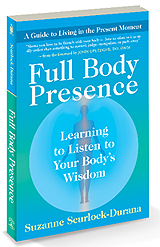
I recently started reading a book called Full Body Presence by Suzanne Scurlock-Durana. The first chapter had me hooked.
In those first few pages she wrote of something that I have known on some level, but seeing it in print made it so much more tangible. She describes many instances when we don't trust our internal awareness - for example, feeling intense grief over a dear friend moving away but being told by people around you that your grief was not important, and shameful..."Why are you worried about it? You have many other friends, right?" Or having a creepy reaction to someone in your life and being told to stop being so silly and jumping to conclusions. "In all these examples, your body was telling you something important, but those around you tried to convince you that what you were sensing wasn't real or valid" (page 9). It was this lack of trust of our inner and deepest self that struck a chord within me. She further describes how a lack of trust of our inner worlds leads us to looking for external sources to shape, define, solve, remedy our lives. Take grief for example. Our grief slows us down physically and mentally. We feel tired, lethargic, numb, confused, disorientated, lost and sometimes even crazy. Our emotions are all over the map. We feel so different, our lives feel foreign. We wish we could go back in time and never let go of the past. The worst part is this: In the throngs of grief you don't know what to do. You've never lived like this before. If you don't know, and don't trust what you feel inside, you look outside yourself for the answers. You look to a society that pushes speed, rewards efficient solutions, reveres stoicism, and demands productivity. We, as a society, don't do well with stillness, solitude, loneliness, pain, and hurt. So here we are. "Keep really busy," they advise. "Don't cry. She wouldn't want you to be sad," they scold. "You need to get back to how you were before he died," they push. "Don't live in the past," they warn. "Stop feeling sorry for yourself," they say. "Quit playing the victim." Need I go on? We are taught to not trust our grief. Intuiting the message, reading between the lines, understanding the subtext, we hear this: "Whatever grief-striken energy you feel inside you is wrong. You feel the wrong things. You think the wrong things. You are doing it wrong." How horrible. What I teach in Yoga for Grief Support is this: "Whatever grief-stricken energy you feel inside you is something to pay attention to. There is wisdom there. Let's learn, together, how to touch those wounds with compassion." If you feel it, it's real. If you feel it, it's important. If you feel it, you can heal it. Be curious about it. What is it saying? What is it's message? What is it's deepest need? What if you believed that your internal world is telling you something very important about how you need to heal and nurture your broken heart? Imagine, just for a second that the grief within you can be trusted - even in it's painful. I mean, you are hurt, afterall. Let's spend some time there. Say to it, "I will take care of you." This is what moving towards your pain is. You must move (gently and with no rewards for speed) towards (and through) your pain to heal. Suzanne Scurlock-Durana writes that our bodies are "incredible navigational systems that inform us constantly, from our gut instincts to our heart's deepest yearnings" (page 5). Yeessss! Let's shift our relationship to our instincts and our senses from one of mistrust and doubt to reliance, and connection. Together. I'd love to hear your feedback on this book if/as you read it. Please feel free to post comments under this blog. Namaste, Sandy
0 Comments
|
AuthorSandy Ayre Categories
All
Archives
December 2022
|
Classes
|
Helpful Info
|
|

 RSS Feed
RSS Feed
